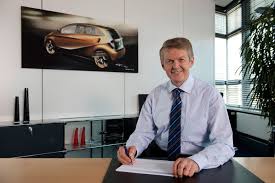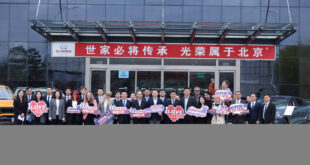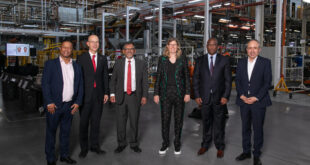
(INTERVIEW) Prof. Dr. Thomas Weber, 62, has been responsible for Daimler Group Research and Mercedes-Benz Cars Development for 12 years. This means he is involved in a key position in the ongoing largest technological transformation the automobile has undergone in its 130-year history. Ahead of his retirement at the end of 2016, he took time off to explain the rationale behind the optimization of advanced high-tech engines and other issues. Excerpts;
Prof. Dr Weber, electric cars and hybrids are touted as the drive systems of the future. Does this mean that the era of the internal combustion engine is finally over?
I don’t think so. The optimisation of advanced high-tech engines plays a key role in our road map towards sustainable mobility. For the mobility of the future, we are deliberately not committing ourselves to one solitary form of drive system, but to a coexistence of efficient and clean petrol engines, diesels, plug-in hybrids, battery and hydrogen drive systems. Each of these types of drive system has its justification and future prospects.
Is this in each case dependent on the different markets and customers?
We have a unique vehicle portfolio: from the little smart to the heavy-duty truck, we cover every mobility need worldwide. This requires us to think holistically and to offer forms of drive system that are precisely tailored to the respective customer requirements and vehicle types. And please don’t forget: we have managed to cut the NEDC fuel consumption of our vehicle fleet practically by half within 20 years ; thanks to rigorous advancement of the internal combustion engine.
Last year, with its family of premium diesel engines, Mercedes-Benz unveiled a completely new series of powertrains. Now, you’re bringing out two all-new petrol engines. It’s no longer all that frequent in the automotive industry for engineers to be given the freedom to design an entirely new engine, is it?
Indeed. When our engine developers come back from specialist congresses, they sometimes tell me how they are somewhat envied by their colleagues (laughs). But our guiding principle is “The best or nothing”, so that’s the way it has to be. If high-tech engines are part of the road map towards sustainable mobility, they also need to be systematically designed to meet current and future requirements. Take our new six-cylinder in-line petrol engine M 256, for example: this is the first engine that we have systematically designed for electrification from the outset.
With the Integrated Starter-Alternator (ISG) and 48 V electrical system in the M 256, the boundaries between internal combustion engine and hybrid become blurred, don’t they?
Precisely. After all, high-tech engine and electrification are not in competition with each other – on the contrary: they complement each other perfectly in many applications. The ISG is responsible for hybrid functions, such as boost or energy recovery, while allowing fuel savings that were previously reserved for high-voltage hybrid technology. And the electric auxiliary compressor makes for an impressive start-off experience with the M 256, bridging the time lag before the large exhaust turbocharger cuts in to full effect – a cool driving experience.
Why are six-cylinder in-line engines now experiencing such a comeback at Mercedes-Benz, while other manufacturers clearly see them as obsolescent?
Once again, electrification is the key factor. The absence of a belt drive makes for a highly compact overall length, with the in-line configuration making space for important ancillary components on either side of the engine. When you experience the new six-cylinder engine in action, you will see – its driving characteristics and consumption speak for themselves.
So downsizing is just an option and not an end in itself?
We prefer the word “rightsizing”, i.e. tailoring the engine to the needs of the customer. Instead of trimming the number of cylinders from the outset, thereby foregoing refinement and output, there are much more intelligent solutions. For example, our new V8 biturbo petrol engine M 176 uses cylinder shutoff. At part load up to 3600 rpm, it is an especially efficient four-cylinder engine. Then, within milliseconds and imperceptibly for the vehicle occupants, cylinders 2, 3, 5 and 8 cut in. This transforms the engine into a supremely refined V8 – a technological treat without equal.
Biographical details:
Prof. Dr. Thomas Weber has been a Member of the Board of Management of Daimler AG since 1 January 2003 and in this role responsible for Group Research and Mercedes-Benz Cars Development since 1 May 2014. He is due to retire at the end of 2016. Thomas Weber was born on 26 May 1954 in Scharnhausen, Germany. After technical training at what was then Daimler-Benz AG, he studied mechanical engineering at Stuttgart University and graduated in 1980. He then went on to work as a research associate at Stuttgart University and the Fraunhofer Institute. He completed his doctorate at Stuttgart University in 1987 and joined the former Daimler-Benz AG.
In 2010, he was appointed Honorary Professor at Stuttgart University.
Previous positions at the company:
- Deputy Member of the Board of Management, Research and Technology, DaimlerChrysler AG, 2003
- Spokesman of the Management Board A-Class and Head of the Rastatt Plant, DaimlerChrysler AG, 2002
- Head of the Rastatt Plant, DaimlerChrysler AG, 1999
- Centre Manager Mercedes-Benz Engine Production Stuttgart, DaimlerChrysler AG, 1998
- Head of the Bad Cannstatt Engine Plant, Daimler-Benz AG, 1995
- Project New V-Engine Generation, Daimler-Benz AG, 1994
- Assistant to the Board of Management Passenger Car Production and Commercial Vehicle Development, Mercedes-Benz AG, 1991
- Planning Engine Production, Untertürkheim Plant, Daimler-Benz AG, 1987
 ..:: AUTO REPORT AFRICA ::..
..:: AUTO REPORT AFRICA ::..




